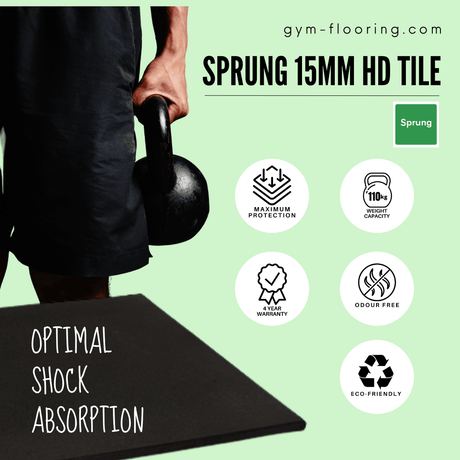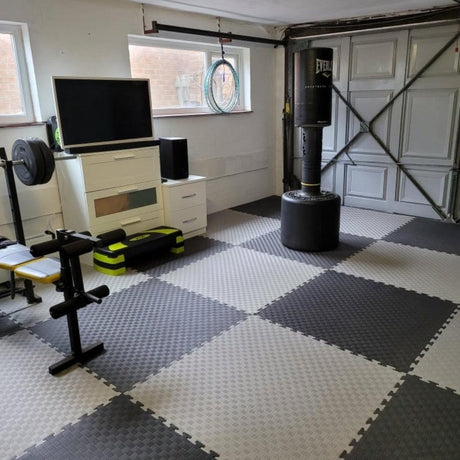Building a home gym can be an enticing idea for many. But here’s the million-dollar question: will it actually get used? Or will your new squat rack just become another piece of expensive furniture gathering dust? On the flip side, could having a home gym be the key to maintaining accountability and removing all those excuses we often make for skipping workouts?
We all know the struggle—you're too busy to hit the gym, and it feels like it's just too much of a hassle to drive there, especially when you’re already juggling work, family, and other commitments. It’s easy to tell yourself that a quick walk around the block is good enough, but is it really?
Let's dive into why setting up a home gym could be just the thing to keep you on track, and how it could help you work towards your fitness goals more effectively.
Table of Contents
Fitness Should Be Simple and Practical
Enjoy Your Own Private Workout Space
Freedom to Create Your Perfect Space
Fitness Should Be Simple and Practical

For fitness to truly become part of your life, it needs to be practical and easy to incorporate into your daily routine. Let’s face it: the thought of waking up at 5am, driving to the gym, then rushing back home to shower and get ready for work? It’s not exactly sustainable for most people. Between the traffic, the time it takes, and trying to fit it all into an already packed day, hitting the gym can quickly feel like a chore rather than a choice.
Having a home gym makes it much easier to get your workout done without the hassle. You can invest in a few simple pieces of equipment like dumbbells, kettlebells, or a resistance band. With just a small space in your home, you can create a routine that’s both sustainable and effective—no more excuses, no more time wasted on travel.
Enjoy Your Own Private Workout Space
One of the biggest advantages of a home gym is the privacy it offers. No more worrying about who’s watching you or feeling self-conscious about your workout. You get to exercise in comfort, wearing whatever you like, without the pressure of anyone else’s gaze. This also means you can focus entirely on your workout, improving your form and technique without distractions.
At a commercial gym, you might find yourself waiting for equipment, or even worrying that someone will catch you doing a less-than-perfect exercise. At home, those worries vanish, and you can truly enjoy your workout in peace.
A Smart Financial Move
Gym memberships are not cheap. The average person spends around £780 a year on a gym membership, which works out to £65 a month. And that’s before we start talking about extra costs like personal trainers, travel, new workout clothes, and those overpriced post-workout shakes.
When you invest in your own home gym, those ongoing costs disappear. Sure, you’ll need to spend some money upfront on equipment, but the long-term savings are substantial. Plus, you’re not tied into a membership, so you can cancel at any time. Over a few years, the cost of your home gym could work out much cheaper than constantly renewing that gym membership.
The Ultimate Convenience

Perhaps the most obvious benefit of a home gym is the sheer convenience it offers. If you miss a workout, there’s no need to reschedule it or try to fit it in elsewhere—your gym is always right there, ready to go. You can work out whenever it suits you, whether it’s early in the morning before work, during your lunch break, or late at night when everything else has calmed down.
This flexibility makes it so much easier to stick to your fitness routine. You’ll never need to rush through a workout because the gym is about to close, and there’s no need to deal with crowded gym hours. Plus, holidays or busy periods at work don’t have to derail your fitness goals.
Customer Insight: Topic "How Important is a Personal Workout Space?"
"I created a small gym in our spare room which is now a space I can escape to for workouts and meditation. I found it really hard to keep to regular workouts or going to the gym so this has been particularly good for keeping me consistent."
Freedom to Create Your Perfect Space
Working out at home also gives you full control over your environment. No more waiting around for machines to become available or dealing with loud, distracting music. You get to pick the equipment you want, set up your space exactly how you like it, and play the music that motivates you—whether that’s pumping beats or peaceful instrumental tracks.
The beauty of a home gym is the freedom it offers. You’re in charge of your workout space, and there’s no one else around to make you feel rushed or uncomfortable. Whether you're lifting heavy weights or doing a yoga session, you can take your time and truly enjoy your workout.
Get Your Family Involved
A home gym isn’t just great for solo workouts. It can also bring the whole family into the fitness game. Exercising together can be a fun and motivating way to bond, and it’s a great way to encourage everyone in the household to take their health seriously.
Whether it’s a family yoga session, partner workouts, or even getting your kids involved in a fitness challenge, having a home gym creates an opportunity for everyone to stay active. And, of course, it eliminates the need for multiple gym memberships, making it an affordable option for the whole family.
Tips for Creating Your Own Home Gym

If you're thinking of setting up your own home gym, here are a few tips to help you make the most of the space you have:
1. Choose the Right Space:
Not everyone has a spare room just waiting to become a gym, but you’d be surprised at how many places in your home could work. Spare bedrooms, basements, garages, or even unused corners of your living room or bedroom can be transformed into workout spaces. The key is to find a place that’s big enough to move around in comfortably, has proper ventilation, and can accommodate your equipment.
2. Start Simple and Gradual:
You don’t need to break the bank on fancy equipment straight away. Start with the basics: dumbbells, resistance bands, a yoga mat, and maybe a kettlebell. As your fitness routine grows, you can add to your collection. It’s easy to upgrade over time, but don’t feel pressured to buy everything at once.
3. Consider Flooring:
If you’re working with heavy weights or doing high-impact exercises, make sure your flooring can handle it. Consider getting rubber gym mats to protect both your floor and your equipment.
4. Make It Motivating:
Create an environment that inspires you to work out. This could be through adding motivating posters, choosing a playlist that gets you moving, or setting up a mirror to monitor your form. The more enjoyable the space, the more likely you’ll stick with your routine.
5. Prioritise Safety:
While it’s great to have a home gym, make sure you’re using the equipment properly and safely. If you’re lifting heavy weights or trying new exercises, always focus on form to avoid injury.

Conclusion
In short, setting up a home gym offers numerous advantages—from privacy and cost savings to flexibility and the freedom to work out whenever you like. Whether you're working out solo or encouraging the whole family to join in, a home gym can be a powerful tool to help you achieve your fitness goals.
Ready to get started on your home gym journey? Explore our workouts mats for home and fitness flooring options for some inspiration.




















